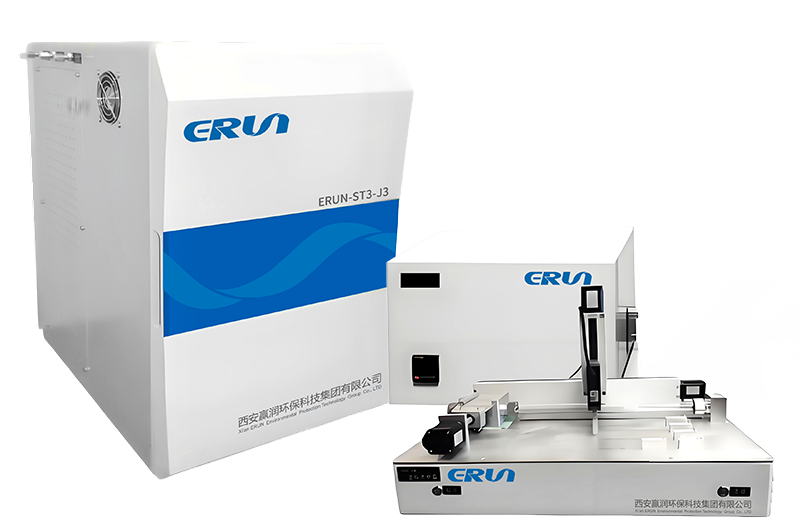Water quality is a cornerstone of safety and efficiency across industries such as pharmaceuticals, semiconductors, environmental monitoring, and wastewater treatment. Total Organic Carbon (TOC) testing is a critical method for assessing water purity by measuring the carbon content in organic compounds. Elevated TOC levels can indicate organic pollutants, which may compromise human health, industrial processes, or environmental ecosystems. This article explores the significance of TOC testing, its applications, real-world case studies, and how the ERUN-ST3-J3 Laboratory Benchtop Total Organic Carbon Analyser addresses the needs of modern water quality testing.

TOC testing is a non-specific indicator of water quality, detecting organic carbon that pure water should not contain. Unlike Biochemical Oxygen Demand (BOD) or Chemical Oxygen Demand (COD), TOC offers high sensitivity, making it valuable for applications requiring ultra-pure water. Its importance spans multiple sectors:
Pharmaceutical Industry: High-purity water is vital for drug manufacturing. TOC testing ensures compliance with standards like the United States Pharmacopeia (USP), preventing contamination that could affect product safety.
Semiconductor Manufacturing: Trace organic carbon can damage sensitive electronic components. TOC analysis ensures the ultra-pure water needed for fabrication processes.
Environmental Monitoring: TOC levels in rivers, lakes, and groundwater indicate organic pollution, aiding in ecosystem protection and public health.
Wastewater Treatment: TOC measurements assess the efficiency of organic matter removal, ensuring compliance with discharge regulations.
TOC testing is recognized by regulatory bodies worldwide, including the USP, European Pharmacopoeia (EP), and the U.S. Environmental Protection Agency (EPA), which emphasize its role in maintaining water quality standards.
TOC testing is integral to various industries, each with unique requirements:
Pharmaceuticals: TOC is mandatory for purified water and water for injection (WFI) to detect organic contaminants that could compromise drug safety. The USP <643> standard outlines TOC as a required test for pharmaceutical water systems.
Semiconductors: Ultra-pure water is critical to prevent defects in chip manufacturing. TOC analysis ensures water purity, protecting costly production processes.
Environmental Monitoring: TOC testing assesses organic pollution in natural water bodies, helping agencies enforce environmental regulations and protect ecosystems.
Wastewater Treatment: TOC measurements evaluate treatment efficiency, ensuring effluent meets standards like EPA Method 415.3 before discharge.
Real-world applications demonstrate the value of TOC testing:
Pharmaceutical Water Systems
A pharmaceutical company implemented regular TOC testing to comply with USP standards for their water purification system. Using a high-sensitivity TOC analyzer, they detected minor deviations in organic carbon levels, allowing prompt corrective actions. This ensured consistent production quality and regulatory compliance, avoiding costly product recalls.
Semiconductor Fabrication
A semiconductor manufacturer installed online TOC monitoring in their water treatment system. Continuous analysis ensured water purity, reducing the risk of defects in silicon wafer production. This approach improved efficiency and minimized downtime, saving significant costs.
Environmental Water Quality
An environmental agency monitored a river near an industrial zone using TOC analysis. Elevated TOC levels indicated organic pollution from industrial discharges, prompting regulatory measures to reduce environmental impact and protect local water resources.
These cases highlight how TOC testing provides actionable insights, ensuring compliance, efficiency, and environmental protection.
The ERUN-ST3-J3 Laboratory Benchtop Total Organic Carbon Analyser is designed for precise and efficient TOC analysis. Its key specifications include:
| Feature | Specification |
|---|---|
| Applications | Tap water, surface water, seawater, industrial wastewater, battery materials, etc. |
| Detection Limit | 10 ppb (liquid), 50 ppb (solid) |
| Measurement Range | 0–30,000 mg/L (liquid), 0–30,000 ppm (solid) |
| Analysis Time | 2-4 minutes (liquid), <10 minutes (solid) |
| Repeatability | 3% (TOC) |
| Accuracy | 5% |
| Dimensions | 342(W) × 431(D) × 542(H) mm |
| Weight | 41 kg (liquid), 30 kg (solid module) |
| Standards Compliance | ISO8245, HJ501-2009, JJG821-2005 |
Conclusion
TOC testing is a cornerstone of water quality management, ensuring safety, compliance, and efficiency across industries. From preventing contamination in pharmaceuticals to protecting ecosystems in environmental monitoring, TOC analysis provides critical insights into organic pollution. The ERUN-ST3-J3 Laboratory Benchtop Total Organic Carbon Analyser offers a robust, versatile, and precise solution for TOC testing needs.
To learn how the ERUN-ST3-J3 can enhance your water quality testing, visit ERUN Water Analysis Systems or contact our team for a consultation.